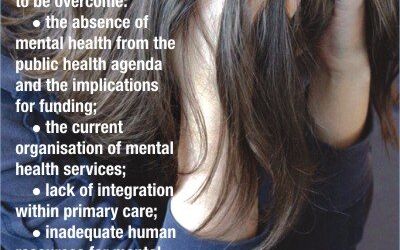The incidence of mental disorder is rising by and by. Wave of migration, industrialisation, individualism, changing socio-cultural norms, changing family pattern, over careerist drive and drug addiction are the important factors considered behind this rising trend. In Bangladesh, a community based research on mental illness conducted in 2005 reported that 16.1 per cent adult populations suffer from various mental disorders.
It is the scenario of only from adult population and no research has been conducted among the children. The situation is more scary when we look at the statistics that say there is only one psychiatrist for 1500000 persons. There are only 120 psychiatrists in our country that depicts the pitiable condition.
After calculation, it has been found that there are only 813 psychiatric beds in Bangladesh to serve the whole nation. That means 172000 people share one bed. In 2005 only 0.44 percent was allotted for mental health in total health budget which was obviously insufficient.
In this situation, we will observe World Mental Health Day today. This year, the World Federation for Mental Health has decided the theme “Mental health in primary care: enhancing treatment and promoting mental health”. The theme is intended to emphasise the benefits of enhancing overall health and promoting mental health by integrating healthcare services.
National survey on mental health in Bangladesh reveals, about 14 lacs people have been suffering from major mental disorders (schizophrenia, mood disorders etc.), 65 lacs people have been suffering from depressive disorder and 1 crore 18 lacs people have been suffering from minor mental disorders (anxiety, phobia , conversion disorder etc).
Besides, about 46 lacs to 70 lacs people are drug addicted. Most of these patients are found in general practice, outpatient service at hospital and primary health care centers.
Mental disorder creates a substantial personal burden for affected individuals and their families. They produce significant economic and social hardship that affects the society. Many people suffer from both physical and mental health problems. Integrated primary care services help ensure that people are treated in a holistic manner, meeting the mental health needs of people with physical disorders as well as the physical health needs of people with mental disorders.
If the mental health care is included in the primary healthcare, our mental health service will reach the outreach. Patients and families can avoid indirect costs associated with seeking specialist care in distant locations. Treatment of common mental disorders is cost effective. Investments by governments can bring important benefits.
To include the mental health component in primary health care service, it should be first included in the health policy. There is dire need of intensive attention to mental health.
There is also a need of fundamental training in mental health with ensuring the supply of common psychotropic drugs in field level. To build a healthy nation we should promote mental health by enhancing treatment facilities in primary health care system. To survive on the runway to globalisation we should not observe this World Mental Health Day only as one-day event, rather give cordial effort to realise the theme for healthy nation.
Dr Ahmed Helal Soton
Source: The Daily Star, October 10, 2009





Leave a Reply